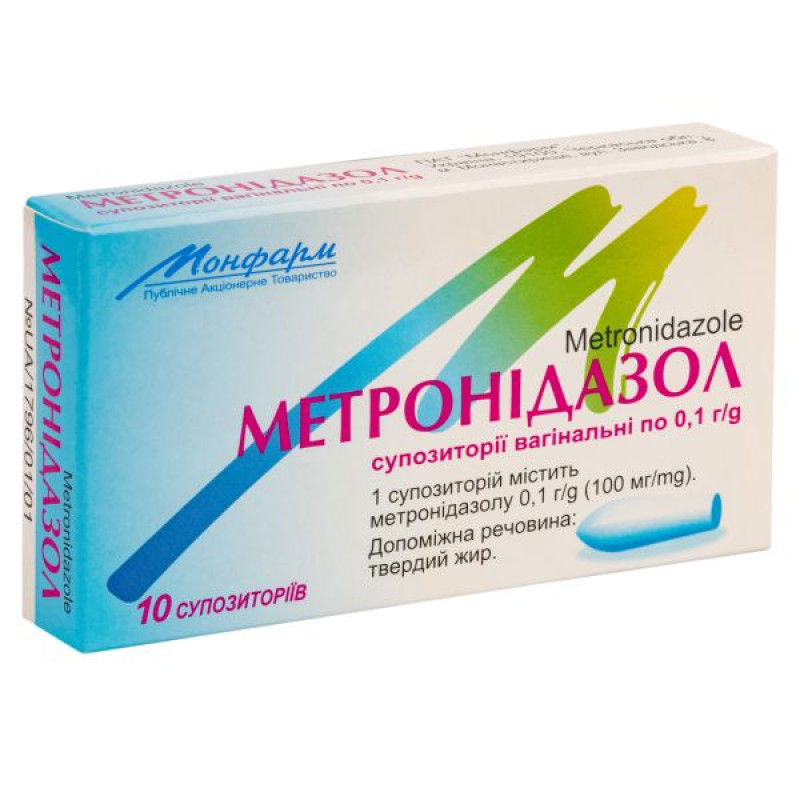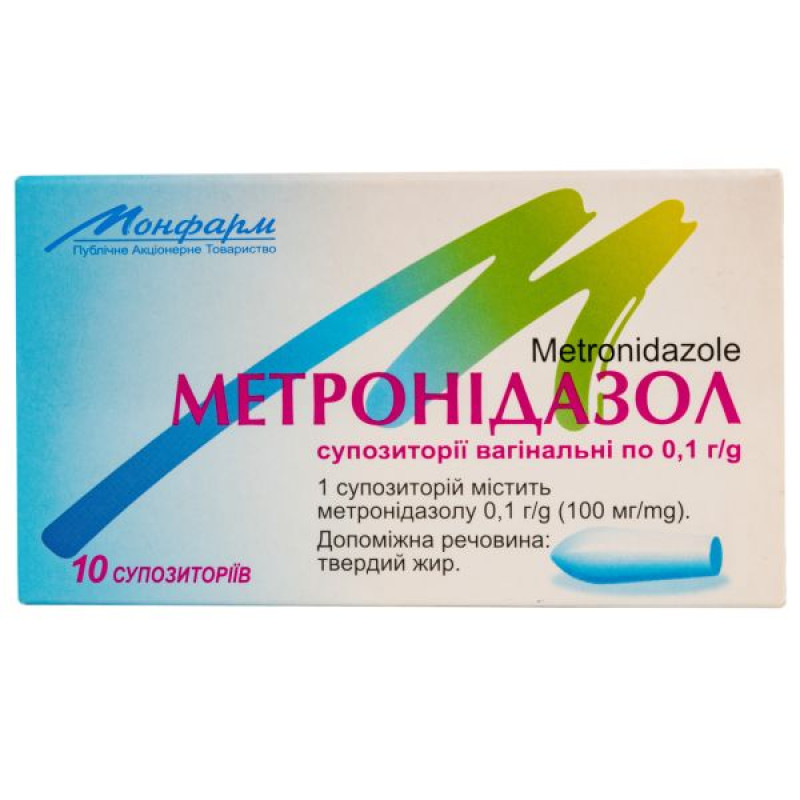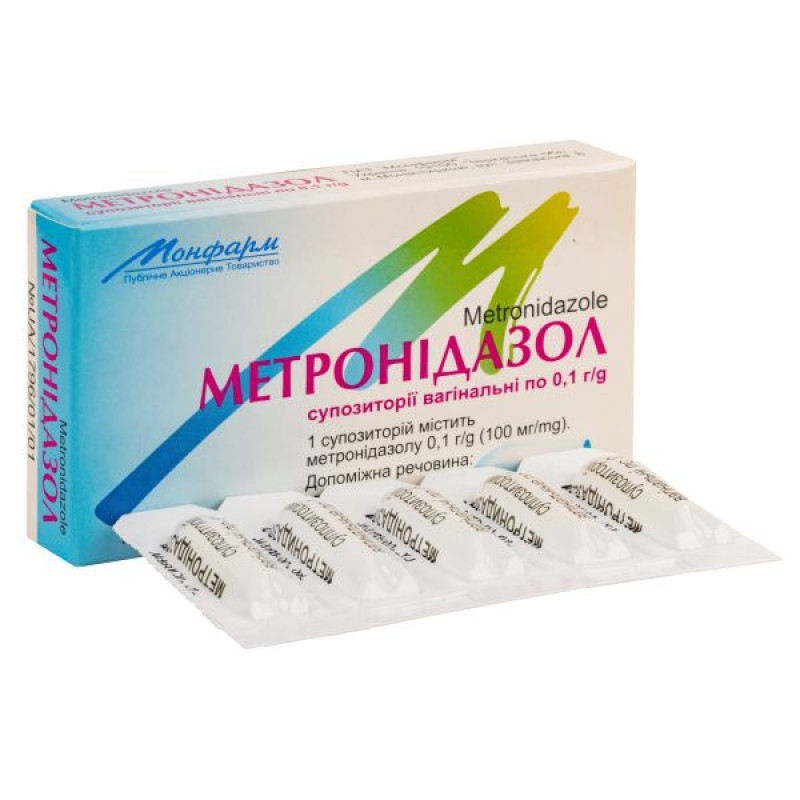Metronidazole vaginal suppositories 0.1 g strip No. 10

"Metronidazole" vaginal suppositories are used for the local treatment of trichomonas and nonspecific vaginitis.
Composition
The active substance is metronidazole (1 suppository contains 0.1 g of metronidazole).
The excipient is solid fat.
Contraindication
Hypersensitivity to metronidazole or other components of the drug; hypersensitivity to imidazole derivatives; not recommended for use in combination with disulfiram or alcohol.Method of application
The drug is allowed to be used for the treatment of adult patients only.
Trichomonas vaginitis. Prescribe two vaginal suppositories 2 times a day for 10 days. Insert the suppository deep into the vagina. Treatment should be carried out with simultaneous oral administration of Metronidazole tablets.
Nonspecific vaginitis. Two vaginal suppositories should be inserted deep into the vagina 2 times a day for 7 days. If necessary, Metronidazole tablets can be administered orally. Simultaneous treatment of the patient's sexual partner is absolutely necessary, even if he has no symptoms of infection.
The maximum duration of treatment with Metronidazole should not exceed 10 days, and the number of treatment courses should be 2-3 per year.
Application features
Pregnant women
Animal studies have not shown a teratogenic effect. Since no teratogenic effect has been observed in animals, no malformations are expected in humans. According to the data, substances that cause malformations in humans have a teratogenic effect in animals in adequately conducted studies in two species. Clinical data have not demonstrated any specific teratogenic or fetotoxic effects associated with metronidazole. However, the absence of such a risk can only be confirmed by epidemiological studies. In this regard, metronidazole should be prescribed during pregnancy only if necessary.
Metronidazole is excreted in breast milk. Therefore, the use of this medicine should be avoided during breastfeeding.
Children
The drug should not be used in children.
Drivers
If dizziness, confusion, hallucinations, seizures, or temporary visual impairment are observed during treatment, you should refrain from driving vehicles and operating other mechanisms.
Overdose
Leukopenia, neuropathy, ataxia, vomiting, mild disorientation may occur. Since a specific antidote to metronidazole is unknown, symptomatic therapy is recommended.
Side effects
From the blood and lymphatic system: very rarely - agranulocytosis, neutropenia, thrombocytopenia, pancytopenia and leukopenia.
Hypersensitivity reactions: skin rashes with hyperemia, itching, redness, urticaria, erythema multiforme; flushing, fever, angioedema, exceptional cases of anaphylactic shock, isolated cases of pustular rash, toxic epidermal necrolysis, fixed toxicoderma, Lyell's syndrome, Stevens-Johnson syndrome.
From the side of the central and peripheral nervous system: peripheral sensory neuropathy, headache, convulsions, dizziness, ataxia, drowsiness, aseptic meningitis; encephalopathy (confusion, increased body temperature, increased sensitivity to light, torticollis, hallucinations, paralysis, visual and movement disorders), and subacute cerebellar syndrome (ataxia, dysarthria, gait disturbance, tremor, nystagmus), which may resolve after discontinuation of the drug.
Psychiatric disorders: mental disorders, including confusion, hallucinations, psychotic reactions with paranoia and/or delirium, which may rarely be accompanied by suicidal thoughts or suicide attempts; depressed mood.
On the part of the organs of vision: temporary disturbances of visual functions, such as diplopia, myopia, blurred vision, decreased visual acuity, changes in color perception; optic neuropathy / neuritis.
Hepatobiliary system: increased liver enzymes (ACT, ALT, LF), cholestatic or mixed hepatitis and liver cell (hepatocyte) damage, sometimes with jaundice; cases of liver failure requiring liver transplantation have been reported in patients treated with metronidazole and other antibiotics.
On the part of the genitourinary system: urine may turn brown-red due to the presence of pigments associated with the metabolism of metronidazole; with prolonged treatment, excessive development of vaginal fungal flora (candidiasis) is sometimes observed, which requires the appointment of antifungal drugs.
On the part of the digestive system: minor gastrointestinal disorders (epigastric pain, nausea, vomiting, diarrhea); inflammation of the oral mucosa, taste disorders (metallic taste in the mouth), glossitis with dry mouth, stomatitis, coated tongue, change in color or appearance of the tongue (mycosis), anorexia, pancreatitis, which is reversible.
Musculoskeletal and connective tissue disorders: myalgia, arthralgia.
Hearing and balance disorders: hearing impairment/hearing loss (including sensorineural); tinnitus.
Other adverse reactions: increased body temperature.
Storage conditions
Store in the original packaging at a temperature not exceeding 25 °C, out of the reach of children.
Shelf life - 2 years.
There are no reviews for this product.
There are no reviews for this product, be the first to leave your review.
No questions about this product, be the first and ask your question.












